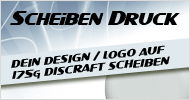|
Why do some discs fly to the left, and others go right?
Like clubs in ball golf, Discraft golf discs are designed to travel on a variety of flight paths to help you meet any course challenge. The way we define a disc's flight characteristics is through the term stability.
 Let's assume you are a right handed player using a backhand throwing motion. If you throw a disc on a straight, flat line using average power and it continues to fly straight, that disc is considered to be stable, and would be given a stability rating of (0). Let's assume you are a right handed player using a backhand throwing motion. If you throw a disc on a straight, flat line using average power and it continues to fly straight, that disc is considered to be stable, and would be given a stability rating of (0).
Now you choose another disc, and this one fades to the right. We call that disc understable, and would give it a negative stability rating of (-1) for a gentle turn, and (-3) for a more severe turn. When it comes to drivers, understable discs are easiest for new players to control.
Most golf discs -- especially drivers -- tend to fade to the left, which would put them somewhere within the overstable range. This is the more natural flight path for sharp edged discs. These discs get a positive rating of (1) for a subtle fade, or (3) for a hard turn.
Overstable discs fade away from the direction of the spin of the disc. In the examples above, the spin on the disc is clockwise (to the right), so an overstable disc fades left. The chart will need to be reversed whenever the spin on the disc is reversed. For example, a left handed player using a backhand throw (counter clockwise spin) will see an overstable disc fade right, not left. The same goes for a righty using a forehand throw, and so on.
 When shopping for Discraft golf discs, you'll see a stability rating on each disc. You might see this one (a rating of 0 stability) on a putter, a class of disc that tends to fly slow and straight. When shopping for Discraft golf discs, you'll see a stability rating on each disc. You might see this one (a rating of 0 stability) on a putter, a class of disc that tends to fly slow and straight.
So what should I be shopping for?
You'll want a mix of stability in your bag. Overstable discs are great for throwing hyzer shots on dogleg left holes, long distance 'S' shots, overhand air shots or for holding a line into a headwind, understable for anhyzer shots on a dogleg right or for roller shots, and stable discs for navigating tight, straight fairways. As you gain experience and get to know how your discs fly under different circumstances, you'll want to experiment with additional discs and stabilities to see which ones fit your style and fill additional needs in your bag. Enjoy!
|
 0 (0,00 EUR) | Kasse
0 (0,00 EUR) | Kasse

 0 (0,00 EUR) | Kasse
0 (0,00 EUR) | Kasse